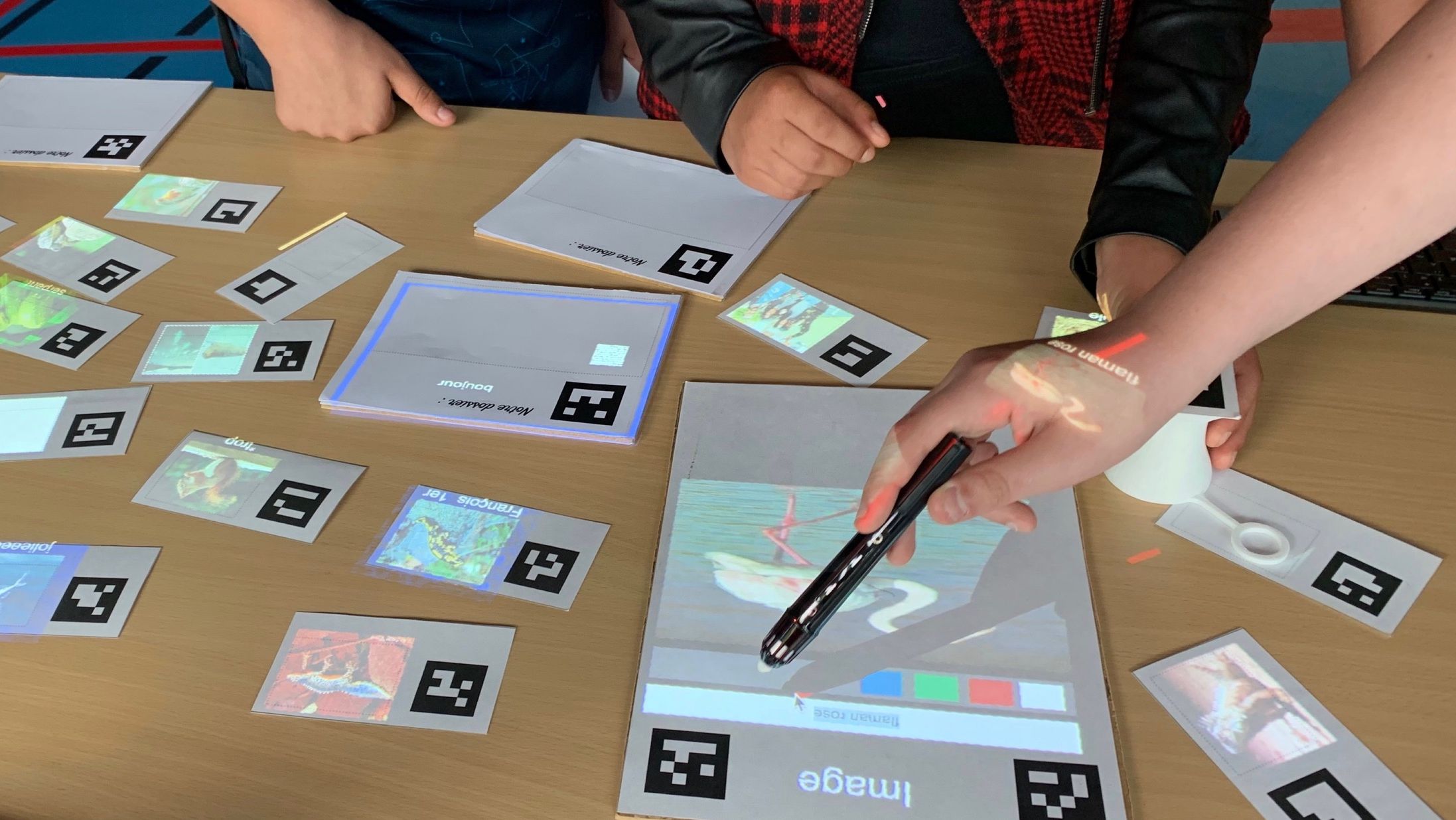Co-Idea: bringing augmented reality into the classroom
Date:
Changed on 19/04/2023

The aim behind Co-Idea, a digital deep tech start-up that is currently being supported by Inria Startup Studio, is to facilitate the development of new forms of active teaching, both in France and internationally, making pupils active participants in the learning process. The project is jointly run by two researchers turned entrepreneurs: Philippe Giraudeau, a specialist in Spatial Augmented Reality, who started out with the Potioc project team at the University of Bordeaux Inria centre; and Alexis Olry de Rancourt, a specialist in Human-Computer Interaction, who works for Perseus (Psychologie Ergonomique et Sociale pour l'Expérience Utilisateurs - Ergonomic and Social Psychology for User Experience), a laboratory at the University of Lorraine.
For the past five years, both have been participants in e-TAC, a research project coordinated by the University of Lorraine as part of France’s Investments for the Future programme. Run in conjunction with Inria, the aim of the project is “to promote collaborative learning through tangible and augmented interfaces”. What sets it apart is that it combines the benefits of augmented reality with the benefits of tangible interfaces (physical objects such as paper or pens), commonly used to interact with digital data.
“The technology our start-up is based on, which was developed as part of e-TAC, involves a video projector and a camera, fitted just above it”, explains Philippe Giraudeau. “In the classroom, the video projector can be used to project a digital environment onto a table, or a printed map equipped with a QR Code, for example. The camera then records information on what is happening on the table, making the projection interactive.”
This is known as spatial augmented reality: the device (in this case the video projector) augments the space around multiple learners by projecting digital content onto it. As Philippe Giraudeau explains, the advantage of this is that “There is no need to use a traditional computer (with a keyboard, a screen and a mouse, and so on), which often means two people from the group handling the keyboard and the mouse, while the others do practically nothing. We bring digital right into the space occupied by users - on a table or on paper - so that they can work in groups. It has been established that this type of cooperation makes pupils better at retaining information, and helps them to develop skills in terms of how they react.”
Co-Idea is cheaper and takes up less space than an interactive table. The primary aim of its design is to be discreet for both pupils and teachers, who won’t need any particular IT skills in order to be able to get to grips with it. “We strove to ensure there was no ‘wow effect’ - the surprise reaction people experience when discovering a new type of technology”, explains Alexis Olry de Rancourt, who is primarily concerned with the ergonomics of the device and its usefulness in an educational context. “We're not developing technology for the sake of it. Equally, this is not a game or an innovation that can be used to surf the internet, for example.”
This last point is not unimportant in the current context - in France, the education sector has yet to experience its “digital revolution”, as André Tricot, professor of Psychology and specialist in instructional design, and Jean-François Chesné, an Executive Coordinator of the CNESCO (the French National Centre for the Study of Education Systems), explained in a report published in late 2020. In the authors’ view, supplying tablets, laptops and interactive whiteboards may generate some “positive effects”, but is not likely to produce “a new way of teaching and learning”.
Twelve spatial augmented reality devices, known as CARDS, were deployed in classrooms in two middle schools in Moselle, one in Metz and one in Saint-Avold. Around fifty or so teachers and more than a thousand pupils between Primary 5 and Third Year, working in groups of five or six, contributed to the design brief, carrying out advance testing on the solution over a period of four years.
“We filmed and analysed hundreds of hours of video footage of pupils working, either with or without the device”, explains Alexis Olry de Rancourt. “The goal was to grade behaviour during activities and to identify whether responses were positive or negative with regard to the learning taking place and the group of learners. Was this creating conflict or contributing to people working together?” Regular meetings with teachers also helped the young start-up to develop an understanding of how they worked and in which educational situations this innovation could be beneficial in the future.
Quantitative and qualitative feedback were used to improve this tool for group working, particularly from the point of view of teachers called upon to assist with it. With a view towards making class management easier, Co-Idea has developed a support box (CalMe) aimed at helping learners to become more autonomous. “They have to come together as a group before pushing the button to call the teacher, vote or save data”, explains Alexis Olry de Rancourt.
We want to move away from the pyramid structure of the teacher-pupil relationship, enabling pupils to learn as much as possible within social groups, which all humans do.
Co-Idea will be officially launched as a company in September 2022, following the completion of the support and training provided by Inria Startup Studio. Subsequent to a recruitment phase (focusing on sales staff, engineers and technicians), the company will market its first devices and services (training, designing customised software, etc.) in the first half of 2023, targeting primary schools, middle schools, secondary schools and universities, as well as training institutes. On 15th June, the founders of Co-Idea will hold an exclusive presentation of the tools they have developed at the VivaTech conference in Paris, at the Inria Startup Studio stand.
#Podcast: What is the point of research...in digital education?, Inria, 24/8/2021.
How the education sector is reinventing itself through digital, Le Siècle digital, 4/4/2022.